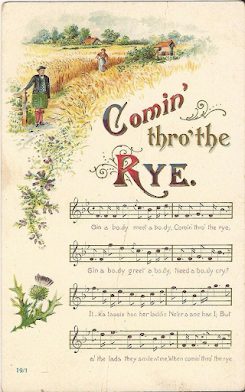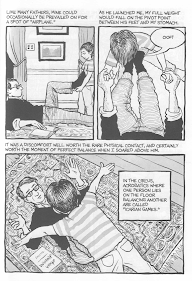Xerox Paper to the Rescue
For me, the peak of the novel was when Jason finds a stack of Xeroxes with a message supposedly from Mr. Kempsey, his form teacher, in response to Jason’s bully situation. Much like lines from an old bearded wizard in the middle of a knight’s quest, or an ancient clam who has seen it all, these words hold the same sagacity. They provide the harsh truth--“contrary to popular wisdom, bullies are rarely cowards;” they poke at recent events Jason has been struggling with--”Hankering for security or popularity makes you weak and vulnerable;” and they also state facts, which in context are excellent advice, particularly the last line, “Adolescence dies in its fourth year. You live to be eighty” (Mitchell 213). Jason’s narrative throughout this whole novel has been clouded by his hyper-sensitive awareness of others around him, including the social hierarchy amongst his peers. The influence of others’ thoughts even seep into his inner voice in the names of Hangman, Maggot, and Unborn Twin. Yet the last words of Mr. Kempsey strike a stark contrast to this perspective, and it’s a crucial turning point of Jason’s coming-of-age transformation.
It’s not that Jason and the bullies suddenly become chums, but after he finds the paper, his response to the bullying begins to change. When Ross Wilcox and his posse commence their usual harassment of Jason on the school bus home, rather than let it bother him, Jason tries to keep a cool head. Ross Wilcox, in an attempt of intimidation, tells him, “‘Say somethin’ then.’ Ross Wilcox came right up close. ‘Maggot’” ( 215). Jason only responds, “‘Your breath smells really bad, Ross…Nobody tells you ‘cause they’re scared of you. But you should clean your teeth more often or eat mints ‘cause it’s chronic’” (215). This could be seen as playing with fire (especially as it prompts more abuse from the group), but it is significant as Jason has not only begun to fight back, but he is standing up for himself using words. Jason has always seemed to be envious of those who can persuade with their speech--Julia, Hugo, etc.--because he is constantly having to “edit” his own speech due to the strangler of his words, Hangman. Hangman often shows up when there is some kind of pressure on Jason from the other person; however, in this scene, Hangman is nowhere to be found. One could say that while fighting against Wilcox and his group, Jason is also learning to stand up to his inner battle.
Jason continues to transform as he internalizes Mr. Kempsey’s wisdom, particularly in the scene with Ross Wilcox’s wallet. In the third to last chapter, “Goose Fair,” Jason finds Ross Wilcox’s lost wallet filled with six hundred pounds. He intends to keep it until he hears from Debby Crombie about Ross’s dad, Gordon Wilcox, who “‘beat [his wife] so black and blue, the hospital had to feed her through a tube for a week,’” over losing a strip of postage stamps (251). Debby Crombie leaves Jason with an impending question, “‘So if he’d do that…over a strip of stamps, imagine what he’ll do over hundreds of pounds!’” (251). Jason ends up returning the wallet to Ross Wilcox, and despite Ross’s ungrateful response, Jason only thinks, “The poor kid” (255). Through his realization that his bully could meet a heavier consequence than Jason could have wished for, he has recognized that there is more than the mere adolescent struggles. As Mr. Kempsey had said, “Adolescence dies in its fourth year. You live to be eighty,” and it seems that Jason has finally begun to understand that this seemingly definitive period of time in his life doesn’t have to dictate his future. He previously allowed the “official” social hierarchy to define who he is. Even outlets of his true self, like his poetry, is covered (his pseudonym, Eliot Bolivar) because he feels that the name Jason Taylor wasn’t fit for a poet; he has let others define his identity for him. However, he realizes that there is so much more to this teenage life not only for him, but even for bullies like Ross Wilcox. Understanding that Ross’s identity is not just a bully, but that he also has family struggles and a whole life that extends past these teenage relationships is what gives Jason an “edge” that he had never had before. Jason actually gains agency by achieving a more distant outlook on his struggles, especially what others think of him. This kind of awareness grants Jason with a greater advantage than popularity would have ever given him.
For Jason, his thirteenth year often feels like the end--struggling to find a place within his peers, working through his identity, coming to terms with his parents’ divorce--yet he has many years still ahead of him. As Julia reminds him on the last page of the novel, coming-of-age, it seems, is understanding that there is a greater life beyond the muck of teenage years. And also that Xerox paper is always there for both your printing needs and life crises.
*Sponsored by Xerox



I wish we'd had time in class to go through every one of these aphorisms about bullying on Mr. Kempsey's xeroxed pages: each one of them resonates with Jason's predicament in some way, some more obviously than others. "The independent befriend the independent" is a good one, for example--think of Dean Moran as a true friend who is "independent" in many ways from the hierarchy/popularity game. Or Holly Deblin, whose "independent" perspective as a "new kid" bolsters Jason's confidence at a key time.
ReplyDeleteThis blog post was a really cool idea - I hadn't given much though to the pamphlets (it feels like there's just so many details in this novel) but they really do reveal so much about Jason more than just being random leaflets strewn around a teacher's office. Jason grows a lot in his empathy and it shows when he starts to see Ross Wilcox not just as an embodiment of the school bully trope but someone who's a product of his home environment, enough for him to feel empathy for him.
ReplyDeleteAnother really interesting result of the Xeroxes appear later on in the chapter Disco. This chapter generally can be seen as Jason's big victory over bullies, as he crushes a calculator, gets an extortionist expelled, and advances his social standing up by many tiers. Most of his actions seem to be guided by a sort of "Unborn Twin" thought process, with the biggest phrase rattling through Jason's head being "Blank out the consequences."
ReplyDeleteBut on page 260, near the bottom of the page, one of the thoughts that pass by is "Let guile be your ally;" one of the little sentences Xeroxed several chapters back. It's kind of ironic, considering that it comes up when Jason's being 'interviewed' by Mr. Kempsey, the same guy who printed the Xeroxes in the first place. Mr. Kempsey's advice is part of the set of skills that Jason uses to achieve his big triumph of the novel.